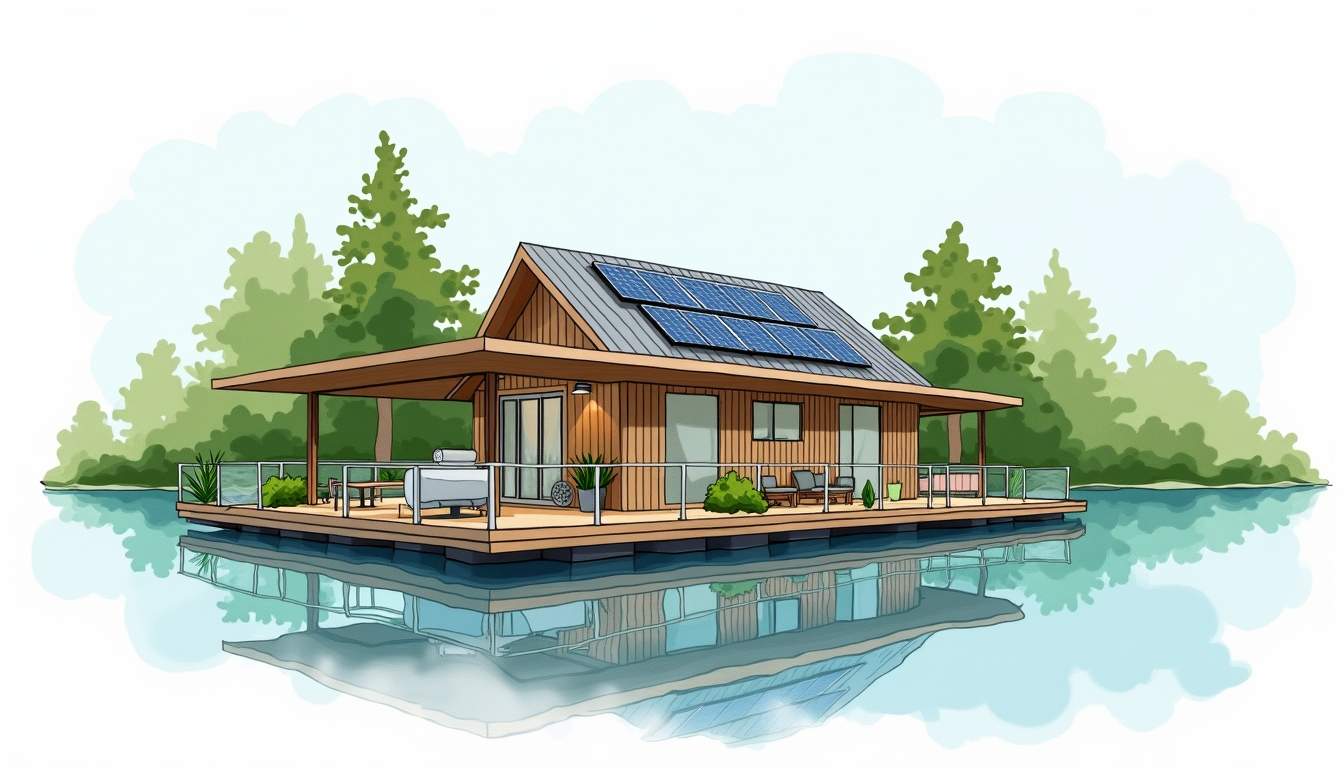
Floating access homes — sometimes called floating houses, houseboats, or floating cabins — have become an appealing option along Tennessee’s many lakes and slow-moving rivers. These unique properties blend waterfront living with the conveniences of a permanent residence, offering a distinctive lifestyle that draws both weekenders and full-time residents. This guide explains everything potential buyers and current owners need to know about floating access homes in Tennessee.
A floating access home is a permanent or semi-permanent dwelling constructed on a floating foundation, such as pontoons, barges, or a series of sealed flotation chambers. These structures are anchored to the shoreline, moored in place, or kept within designated marinas and slips. In Tennessee, floating homes tend to appear on large reservoirs, such as Lake Tennessee Valley Authority (TVA) lakes, and slower stretches of rivers.
There is nuance in terminology: houseboats are generally designed to be mobile and may have propulsion systems, while floating homes are built with permanence in mind and often lack engines. Local zoning, marina rules, and waterway regulations can influence what’s allowed, so clarity on the distinction matters when shopping or building.
Floating access homes offer immediate waterfront access without the need to maintain an extensive shoreline property. They often come with panoramic water views, private docks, and a close connection to activities such as fishing, boating, and kayaking. For many buyers, the appeal is both lifestyle-driven and cost-sensitive: in some markets, a floating home can provide waterfront living at a lower purchase price than a comparable land-based lakefront house.
Climate and regional character also play a role. Tennessee’s temperate climate, plentiful reservoirs, and established recreational boating culture create an inviting environment for floating home owners. Additionally, the welcoming small-town marinas and lakeside communities make social life and seasonal events easy to access.
Many floating homes rest on aluminum or concrete pontoons, or on steel- or concrete-barge systems. Pontoons provide buoyancy and are usually modular, while barge foundations offer a broader base and more load capacity. The choice impacts stability, weight limits, and how utilities are installed.
Houseboats commonly include engines for mobility and are built with navigability in mind. Fixed floating homes, by contrast, are designed to remain stationary. Fixed homes can be more similar to conventional houses in terms of insulation, roofing, and utility hookups because they don’t need to meet the same weight and balance restrictions imposed by mobility.
Construction materials often mirror standard homebuilding, but with added emphasis on moisture resistance and corrosion control. Pressure-treated framing, marine-grade stainless steel fasteners, closed-cell foam insulation, and engineered moisture barriers are common. Roof lines, siding, and drainage must manage humidity and potential spray from the water.
Tennessee has numerous suitable locations, from the expansive Tennessee River and its TVA reservoirs to smaller impoundments and some slow-moving tributaries. Popular lakes include Norris, Cherokee, Douglas, and Center Hill. Each lake and marina has its own set of rules regarding floating structures, so prospective owners should contact the relevant marina, county planning office, and TVA if applicable.
Shallow or highly fluctuating water levels can limit potential locations. Areas with strong currents, heavy commercial traffic, or aggressive seasonal water-level changes are less suitable. Marina slips, private docks, and specially designated floating home communities are the safest starting points to find an appropriate mooring location.
Local ordinances, county regulations, and state waterways rules govern where floating homes can be placed, what permits are required, and whether a floating home is classified as a structure or a vessel. Classification affects taxes, utilities, and insurance. In Tennessee, the TVA often has jurisdiction over broader navigable waters and reservoirs, adding another layer of permitting where applicable.
Setbacks, dock permits, and environmental review may be necessary. Floodplain rules, shoreline protection ordinances, and septic or sewer regulations can also impact feasibility. Consulting a local land-use attorney or an experienced marina manager early in the process helps avoid surprises.
Searching for a floating home involves many of the same steps as buying a conventional home, with a few additional checks. Start by identifying marinas and floating home communities in the desired area, and work with a real estate agent experienced in waterfront and floating properties. Inspect the foundation, anchoring systems, and utility hookups carefully.
Because floating homes are unique, inspections should include a marine surveyor or structural engineer familiar with floating structures. The survey should evaluate hull integrity, flotation capacity, electrical and plumbing systems, and any signs of rot, corrosion, or water intrusion. Confirm the status of the mooring lease or slip agreement, and understand any transfer restrictions or additional fees charged by the marina or homeowner association.
Financing floating homes can be more complicated than standard mortgages. Some lenders will treat floating homes as personal property or as real property depending on permanence, foundation type, and legal classification. Specialized marine lenders and credit unions often provide loans for floating homes, but expect different down-payment requirements and terms.

Tax treatment varies: if a floating home is permanently affixed and classified as real property, it may be subject to property taxes; if considered a vessel, it could be taxed differently. Insurance providers also differ in their approach. Homeowner’s insurance for floating homes often combines elements of marine insurance and traditional homeowner policies, covering hull or floatation damage as well as personal liability and contents. Shop around and work with an agent experienced in marine and waterfront insurance.
Connecting to electricity and municipal water is common when a floating home is moored at a developed marina. Shore power hookups are frequent, but electrical systems must be installed to marine code standards and include proper grounding and GFCI protections. Water supply can be via shore connections or onboard tanks, depending on the situation.

Sewage can be the most challenging issue. Some marinas provide sewer hookups or pump-out services. Where sewer connections are not available, holding tanks and regular pump-outs are required. In Tennessee, septic systems and sanitary rules are enforced to protect water quality; dumping raw sewage into the water is illegal and harmful to local ecosystems.
Regular maintenance is critical to preserve buoyancy, structural integrity, and safety. Hull or pontoon inspections should occur annually, and corrosion-prone components require vigilant attention. Seals, caulking, and through-hull fittings need periodic replacement to prevent leaks. Wood components exposed to wet conditions benefit from marine-grade paints and sealants.
Seasonal maintenance includes winterization in colder northern parts of the state or when waters are subject to freezing, checking mooring lines before and after storm events, and inspecting roof and deck drainage systems. A maintenance checklist and a relationship with a trusted marine contractor will extend the life of the floating home and reduce costly surprises.
Safety considerations include proper anchoring and mooring systems, life jackets, fire extinguishers, carbon monoxide detectors, and well-planned escape routes. Boats and floating structures should have clear evacuation plans and accessible ladders for water entry. Electrical systems must be kept up to code to reduce the risk of shocks or fires.
Emergency preparedness also covers storm readiness. High winds, tornados, and severe thunderstorms can impact marinas; owners should understand local storm procedures, know how to secure lines, and have a plan to move to safer moorings if the floating home is mobile. Keeping an emergency kit and a communication plan are wise precautions.
Floating home living combines outdoor recreation with uniquely intimate connections to nature. Daily routines often include waterborne activities, sunrise and sunset views, and a quieter pace compared with urban living. Communities around marinas can be close-knit, with social events, boating clubs, and volunteer initiatives centered on lake stewardship.
Noise, privacy, and insect management are practical considerations. Proximity to boat traffic may affect noise levels, and mosquitoes near still water require attention to screens and repellents. Residents appreciate the balance of solitude and community that floating access homes often provide.
Common challenges include fluctuating water levels, access for deliveries and guests, insurance complexities, and maintenance costs. Planning ahead helps mitigate these issues. For fluctuating water, adjustable gangways and flexible utility connections can accommodate changes. Clear guest instructions and mooring maps make hosting easier.

Maintaining a reserve fund for unexpected repairs and building relationships with local specialists—marine electricians, hull inspectors, and marina operators—keeps problems from escalating. Regulatory changes and evolving marina policies are also risks; staying informed and involved in local civic and marina associations helps protect long-term interests.
1. Work with professionals familiar with floating homes: agents, surveyors, and legal counsel. 2. Get a comprehensive marine survey and a clear statement on slip or mooring rights. 3. Compare insurance quotes early to understand ongoing costs. 4. Visit the site at different water and weather conditions to see how the home performs. 5. Factor in maintenance, utilities, and marina dues when calculating affordability.
Patience and due diligence are valuable when considering floating homes. These properties deliver a distinctive lifestyle, but the practical realities of water, weather, and regulation require careful planning and ongoing attention.
Floating access homes on Tennessee waters are an attractive choice for those who value waterfront living, recreational access, and a unique sense of place. With thoughtful research into location, construction, legal status, and maintenance, these homes can be both a joyful residence and a sound investment. Prospective buyers and owners who build a relationship with local experts and follow best practices for safety and care will find that life on the water in Tennessee is rewarding and full of possibility.
Ready to elevate your floating home lifestyle with unmatched luxury and community amenities? Tennessee National offers an exclusive gated community featuring a Greg Norman Signature Golf Course, private marina, waterfront dining, and over 20 member amenities—all set within Tennessee’s stunning natural beauty. Whether you prefer a move-in ready home or a custom build, our resort-style living experience perfectly complements the peaceful waterfront lifestyle you desire. Schedule a Private Tour today and start making lasting memories at Tennessee National.